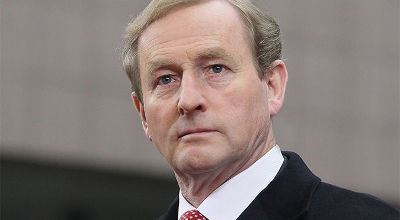Irish PM Received Letters in Blood Over Proposed Abortion Law
Ireland’s prime minister said he has been sent letters written in blood and branded a murderer by opponents of his government’s plans to allow limited access to abortion, an issue that has polarized the country for decades.
Enda Kenny’s government agreed draft legislation in April to allow for limited access to abortion where a woman’s life is in danger, including the threat of suicide, following months of protests from both sides of the debate.
After some 40,000 people massed outside government offices in Dublin on Saturday in the largest anti-abortion demonstration in traditionally Roman Catholic Ireland’s history, Kenny delivered a trenchant defense of the government’s plans.
“I am now being branded by personnel around the country as being a murderer, that I am going to have on my soul the death of 20 million babies,” Kenny told parliament on Wednesday, detailing how he had been sent items of Catholic regalia and threatening messages.
“I’m getting medals, scapulars, plastic fetuses, letters written in blood, telephone calls all over the system and it’s not confined to me.”
A two-decade debate over how Ireland should deal with a Supreme Court ruling that abortion be permitted when a woman’s life was in danger was re-opened last year after the death of a woman who was denied an abortion of her dying fetus.
Successive governments had sidestepped acting on the ruling, the result of a challenge by a 14-year-old rape victim in the so-called “X-case” of 1992 to a constitutional amendment nine years earlier that intended to ban abortion in all instances.
Kenny hopes to enact legislation before parliament adjourns in July despite misgivings among some among his conservative Fine Gael party and a concerted campaign by the Ireland’s once powerful Catholic Church to put pressure on lawmakers.
In a strongly worded statement on Tuesday, the Catholic Bishops of Ireland accused the government of misleading people on the abortion legislation and said every citizen “should be deeply concerned” by the radical changes proposed.
Rocked by a series of child abuse scandals, the church’s influence over society has waned since the 1980s and a younger, secular generation wants to end the practice of Irish women travelling to nearby Britain to terminate their pregnancies.
Kenny, a regular mass goer who delivered a once-unthinkable rebuke to the Vatican over its handling of the scandals two years ago, said he did not agree with many of the statements that the bishops had made.
“My job as taoiseach (prime minister) is to lead the government in governing for the people of the country. That is not confined to any sector of the people, it is for all of the people,” he said to applause from some members of parliament.
“Therefore I am proud to stand here as a public representative, as a taoiseach who happens to be a Catholic but not a Catholic taoiseach.”
Editing by Alison Williams
© 2013 Thomson Reuters. All rights reserved.














































